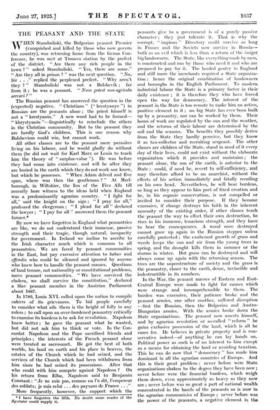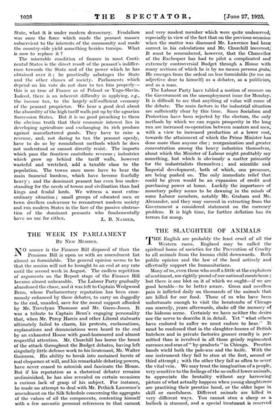THE PEASANT AND THE STATE
WHEN Stambuliski, the Bulgarian peasant Premier (vanquished and killed by those who now govern the country), was returning home from the Genoa Con- ference, he was met at Tirnovo station by the prefect of the district. " Are there any rich people in the town ? " asked Stambuliski. " Yes, there are some." "Are they all in prison ? " was the next question. ".No, Sir . . ." replied the perplexed prefect. " Why aren't they ? " Stambuliski was not a Bolshevik ; far from it ; he was a peasant. " Num potest non-agricola servari ?"
The Russian peasant has answered the question in the (expected) negative. " Christians " (" krestyanye ") in Russian are the peasants alone ; the priest himself is not a " krestyanin." A new word had to be formed- " khrystyanin "—linguistically to reinclude the others in the Christian community. But to the peasant they are hardly God's children. This is one reason why Bolshevism could win, but cannot work.
All other classes are to the peasant mere parasites living on his labour, and he would gladly do without them (he did not wait for Karl Marx or Lenin to teach him the theory of " surplus-value "). He was before they had come into existence, and will be after they are buried in the earth which they do not work nor know, but which he possesses. " When Adam delved and Eve span, where was then the gentleman ? " At Marl- borough, in Wiltshire, the Inn of the Five Alls till recently bore witness to the ideas held when England was a predominantly agrarian country. " I fight for all," said the knight on the sign ; " I pray for all," professed the clergyman ; " I plead for all " declared the lawyer ; " I pay for all '.' answered them the peasant farmer.* By now we have forgotten in England what peasantries are like, we do not -understand their- immense, passive strength and their tragic, though natural, incapacity for government. In Ireland we incline to ascribe to the Irish character much which- is common to all peasantries: We are faced by peasant communities in the East, but pay excessive attention to balms and effendis who could be silenced and ignored by anyone who knew how to handle the peasant masses. Questions of land tenure, not nationality or constitutional problems, move peasant communities. " We have survived the cholera, we shall survive the constitution," declared a Slav peasant member in the Austrian Parliament about 1867.
In 1789, Louis XVI. called upon the nation to compile cahiers of its grievances. To bid people carefully to consider what ails them is the height of folly in any rulers ; to call upon an over-burdened peasantry critically to examine its burdens is to ask for revolution. Napoleon knew better ; • he gave the peasant what he wanted, but did not ask him to think or vote. In the Con- cordat -Napoleon and the Pope sacrificed friends and principles ; the interests of the French peasant alone were treated as sacrosanct. He got the best of both worlds, his land on earth and his place in heaven, the estates of the Church which he had seized, and the services of the Church which had been withdrawn from him since he had seized its possessions. After that who could with him compete against Napoleon ? On his return from Elba, Napoleon said to Benjamin Constant : "Je ne suis pas, comme on l'a dit, l'empereur des soldats; je suis celui . des paysans de France . . ."
More frequently, however; the • support which the *I have fbriotten the fifth. No doubt some reader of the Spxtator could supply it. peasants give to a government is of a purely passive character ; they just tolerate it. That is why the corrupt, " impious " Directory could survive so long in France and the Soviets now survive in Russia— both as an evil which is less than a return of the emigre big landowners. The State, like everything made by men, is constructed and run by those who need it and who are prepared to pay for it. The landed gentry in England and still more the merchants required a State organiza- tion ; hence the original combination of landowners and boroughs in the English Parliament. To modern industrial labour the State is a primary factor in their daily existence ; it is therefore they who have forced open the way for democracy. The interest of the peasant in the State is too remote to make him an active, positive element in it ; no big State has ever been built up by a peasantry, nor can be worked by them. Their hours of work are regulated by the sun and the weather, and the returns of their labour are determined by the soil and the seasons. The benefits they possibly derive from the State they hardly perceive, but they know it as tax-collector and recruiting sergeant. The other classes are children of the State, stand in need of it every.
day of their lives, could not exist without the elaborate organization which it provides and maintains ; the peasant alone, the son of the earth, is anterior to the State ; could, if need be, revert to self-sufficiency, and may therefore afford to be an anarchist, without the effects of his action immediately and fatally recoiling on his own head. Nevertheless, he will bear burdens, so long as they appear to him part of fixed creation and he, in his organic conservatism, is not compelled or invited to consider their purpose. If they become excessive, if change destroys his faith in the inherent necessity of the existing order, if other classes teach the peasant the way to effect their own destruction, he rises in his immense, tenacious strength, and they have to bear the consequences. A wood once destroyed cannot grow up again in the Russian steppes unless carefully protected ; the exuberant growth of grass and weeds keeps the sun and air from the young trees in spring, and the drought kills them in summer or the storms in winter. But grass can be destroyed and will always come up again with the returning season. The trees are the superstructure of society and the grass is the peasantry, closer to the earth, dense, invincible and indestructible in its numbers.
In the War, the peasant masses of Eastern and East- Central Europe were made to fight for causes which were strange and incomprehensible to them. The burden was excessive, their patience broke and the peasant armies, one after another, suffered disruption —first the Russian, then the Bulgarian and Austro-.
Hungarian armies. With the armies broke down the State organizations. The peasant now asserts himself, and by agrarian revolution or so-called " reform " he gains exclusive possession of the land, which is all he cares for. He believes in private property and is con- servative indeed—of anything he can lay hands on. Political power as such is of no interest to him except as a means for obtaining the land or avoiding taxation.
This he can do now that " democracy " has made him dominant in all the agrarian countries of Europe. And this is their great problem : never before were State organizations shaken to the degree they have been now ; never before were the financial burdens, which weigh them down, even approximately as heavy as they now are ; never before was so great a part of national wealth concentrated in the hands of the peasants as is now in.
the agrarian communities of Europe ; -never before. was the power of the peasants, a negative element in the State, what it is under modern democracy. Feudalism was once the force which made the peasant masses subservient to the interests of the community and made the country-side yield something besides turnips. What is now to replace it ?
The miserable condition of finance in most Conti- nental States is the direct result of the peasant's indiffer- ence towards the State and of the power which he has obtained over it ; he practically sabotages the State and the other classes of society. Parliaments which depend on his vote do not dare to tax him properly— this is as true of France as of Poland or Yugo-Slavia. Indeed, there is an inherent difficulty in applying, e.g., the income tax, to the largely self-sufficient economy of the peasant proprietor. We hear a good deal about the absurdity of the high tariff walls put up by the agrarian Succession States. But it is no good preaching to them the obvious truth that their economic interest lies in developing agriculture and exchanging its rich produce against manufactured goods. They have to raise a revenue, and, not daring to tax the peasant openly, have to do so by roundabout methods which he does not understand or cannot directly resist. The imports which pass the frontiers contribute revenue ; industries which grow up behind the tariff walls, however wasteful and wretched, add a taxable class to the population. The towns once more have to bear the main financial burdens, which have become fearfully heavy ; and the dominant peasant has even less under- standing for the needs of towns and civilization than had kings and feudal lords. We witness a most extra- ordinary situation ; small groups of educated men or town dwellers endeavour to reconstruct modern society and run modern States in the face of the passive obstruc- tion of the dominant peasants who fundamentally











































 Previous page
Previous page